NIT6130 - Research Ethics: Examining Human Drug Trials Ethics
VerifiedAdded on 2023/06/13
|6
|1412
|108
Essay
AI Summary
This essay delves into the ethical challenges inherent in human drug trials, focusing on issues such as informed consent, the use of placebos, blinding and randomization, overprotection versus exploitation, and specific concerns within oncological research. It addresses the importance of respect for participants, research integrity, justice, and beneficence as guiding principles. The essay further proposes a response plan to mitigate these risks, emphasizing adherence to ethical guidelines to ensure participant welfare and promote valuable research outcomes. Ultimately, it advocates for a balanced approach that prioritizes ethical considerations to foster trust and advance medical knowledge for the benefit of society.
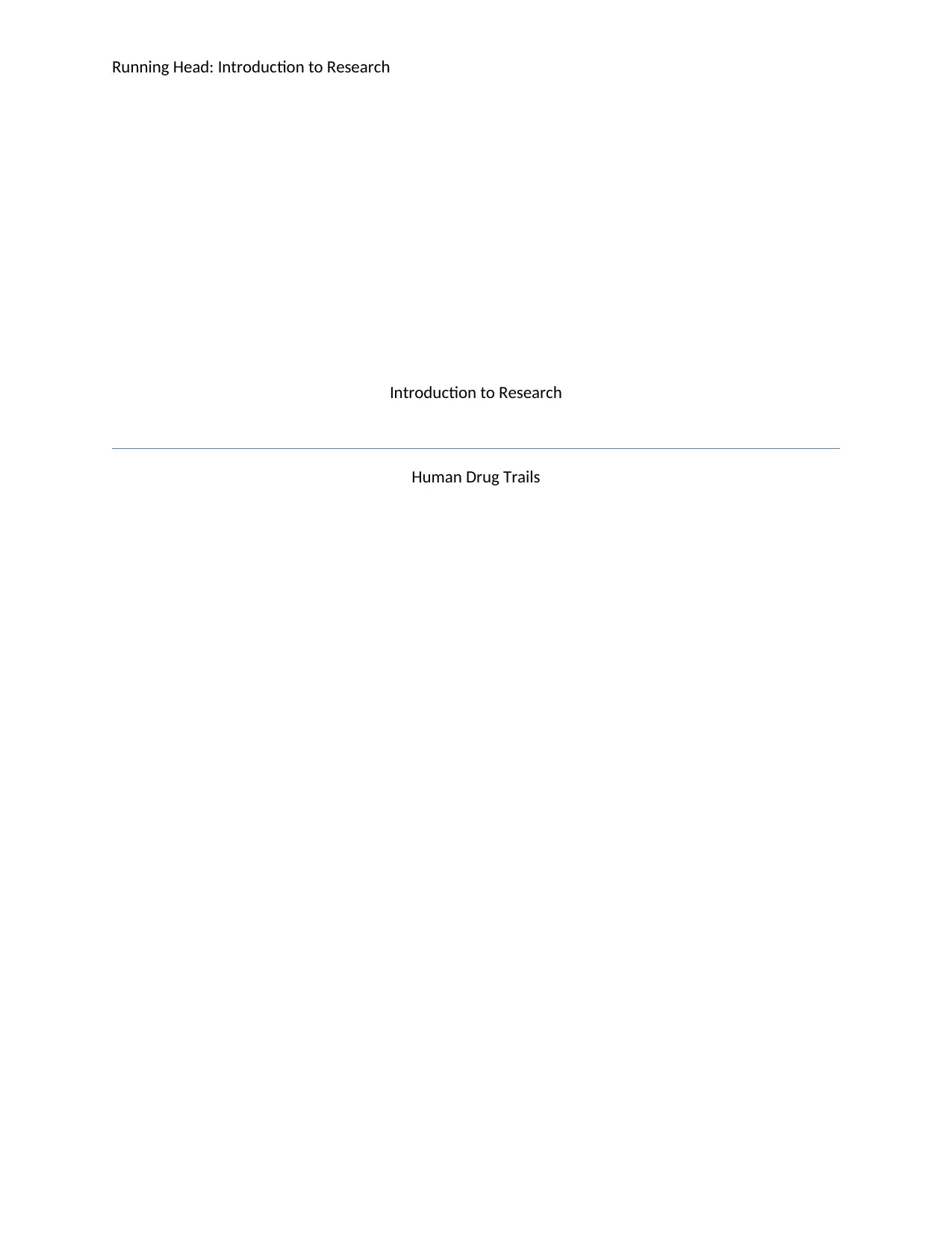
Running Head: Introduction to Research
Introduction to Research
Human Drug Trails
Introduction to Research
Human Drug Trails
Paraphrase This Document
Need a fresh take? Get an instant paraphrase of this document with our AI Paraphraser
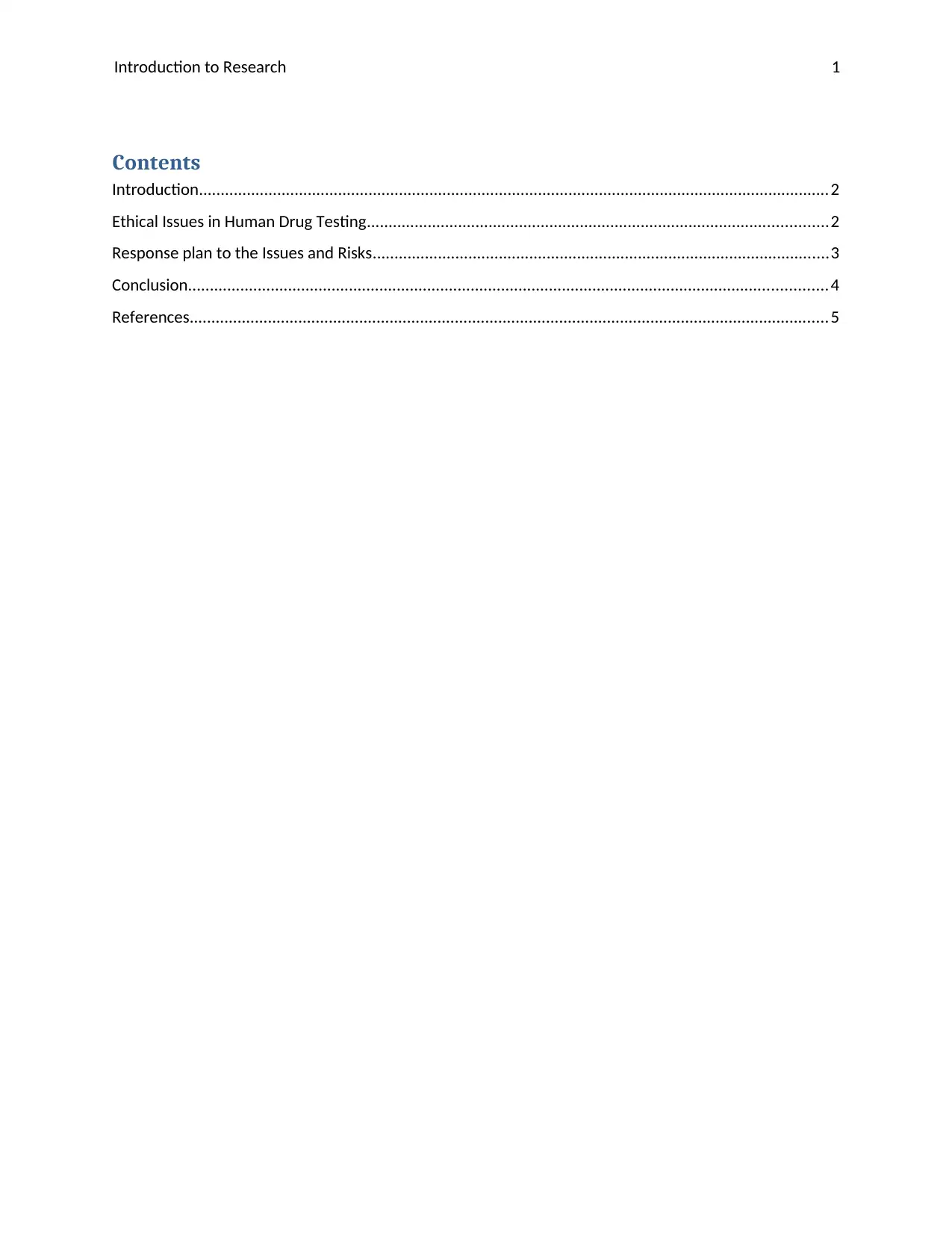
Introduction to Research 1
Contents
Introduction.................................................................................................................................................2
Ethical Issues in Human Drug Testing..........................................................................................................2
Response plan to the Issues and Risks.........................................................................................................3
Conclusion...................................................................................................................................................4
References...................................................................................................................................................5
Contents
Introduction.................................................................................................................................................2
Ethical Issues in Human Drug Testing..........................................................................................................2
Response plan to the Issues and Risks.........................................................................................................3
Conclusion...................................................................................................................................................4
References...................................................................................................................................................5
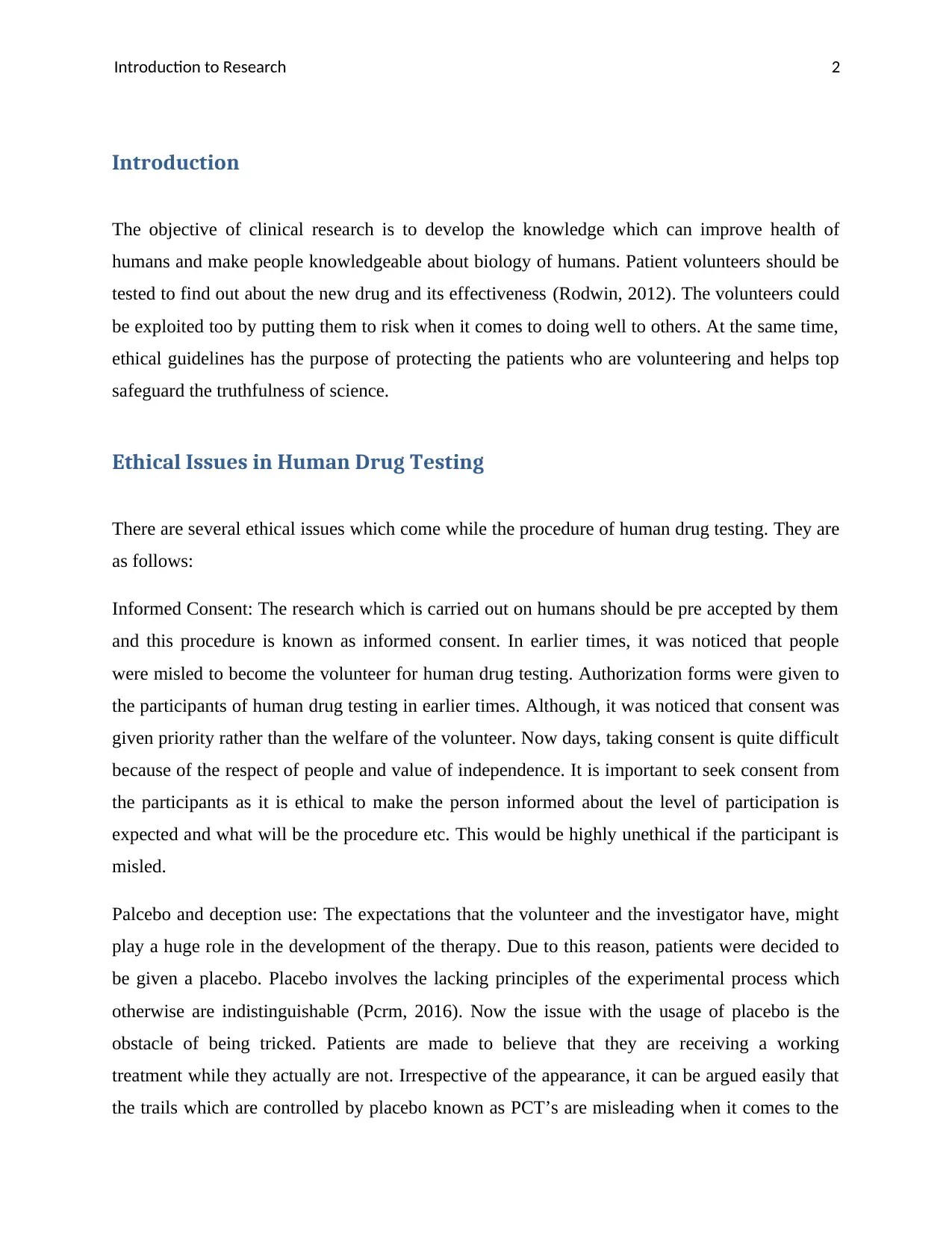
Introduction to Research 2
Introduction
The objective of clinical research is to develop the knowledge which can improve health of
humans and make people knowledgeable about biology of humans. Patient volunteers should be
tested to find out about the new drug and its effectiveness (Rodwin, 2012). The volunteers could
be exploited too by putting them to risk when it comes to doing well to others. At the same time,
ethical guidelines has the purpose of protecting the patients who are volunteering and helps top
safeguard the truthfulness of science.
Ethical Issues in Human Drug Testing
There are several ethical issues which come while the procedure of human drug testing. They are
as follows:
Informed Consent: The research which is carried out on humans should be pre accepted by them
and this procedure is known as informed consent. In earlier times, it was noticed that people
were misled to become the volunteer for human drug testing. Authorization forms were given to
the participants of human drug testing in earlier times. Although, it was noticed that consent was
given priority rather than the welfare of the volunteer. Now days, taking consent is quite difficult
because of the respect of people and value of independence. It is important to seek consent from
the participants as it is ethical to make the person informed about the level of participation is
expected and what will be the procedure etc. This would be highly unethical if the participant is
misled.
Palcebo and deception use: The expectations that the volunteer and the investigator have, might
play a huge role in the development of the therapy. Due to this reason, patients were decided to
be given a placebo. Placebo involves the lacking principles of the experimental process which
otherwise are indistinguishable (Pcrm, 2016). Now the issue with the usage of placebo is the
obstacle of being tricked. Patients are made to believe that they are receiving a working
treatment while they actually are not. Irrespective of the appearance, it can be argued easily that
the trails which are controlled by placebo known as PCT’s are misleading when it comes to the
Introduction
The objective of clinical research is to develop the knowledge which can improve health of
humans and make people knowledgeable about biology of humans. Patient volunteers should be
tested to find out about the new drug and its effectiveness (Rodwin, 2012). The volunteers could
be exploited too by putting them to risk when it comes to doing well to others. At the same time,
ethical guidelines has the purpose of protecting the patients who are volunteering and helps top
safeguard the truthfulness of science.
Ethical Issues in Human Drug Testing
There are several ethical issues which come while the procedure of human drug testing. They are
as follows:
Informed Consent: The research which is carried out on humans should be pre accepted by them
and this procedure is known as informed consent. In earlier times, it was noticed that people
were misled to become the volunteer for human drug testing. Authorization forms were given to
the participants of human drug testing in earlier times. Although, it was noticed that consent was
given priority rather than the welfare of the volunteer. Now days, taking consent is quite difficult
because of the respect of people and value of independence. It is important to seek consent from
the participants as it is ethical to make the person informed about the level of participation is
expected and what will be the procedure etc. This would be highly unethical if the participant is
misled.
Palcebo and deception use: The expectations that the volunteer and the investigator have, might
play a huge role in the development of the therapy. Due to this reason, patients were decided to
be given a placebo. Placebo involves the lacking principles of the experimental process which
otherwise are indistinguishable (Pcrm, 2016). Now the issue with the usage of placebo is the
obstacle of being tricked. Patients are made to believe that they are receiving a working
treatment while they actually are not. Irrespective of the appearance, it can be argued easily that
the trails which are controlled by placebo known as PCT’s are misleading when it comes to the
⊘ This is a preview!⊘
Do you want full access?
Subscribe today to unlock all pages.

Trusted by 1+ million students worldwide
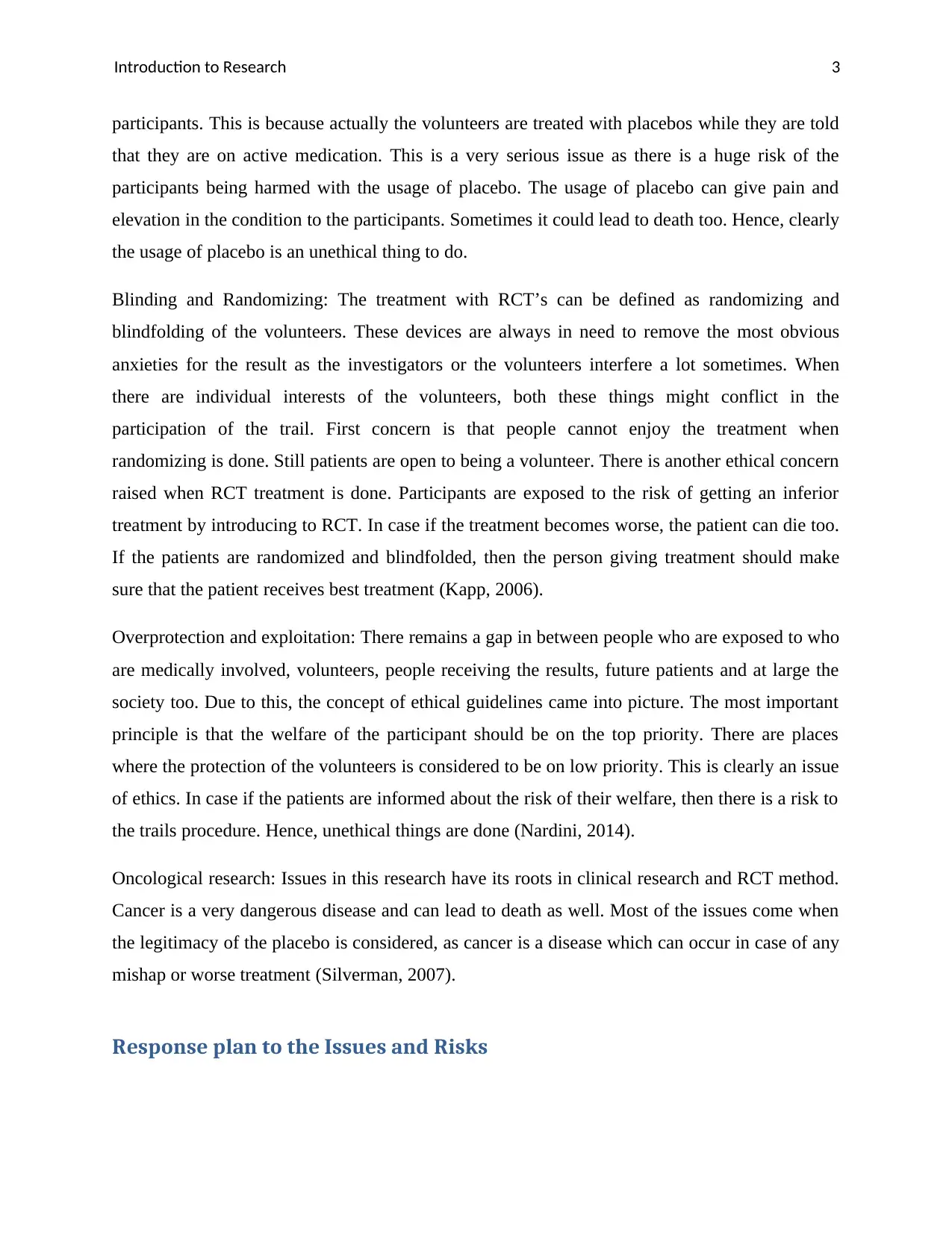
Introduction to Research 3
participants. This is because actually the volunteers are treated with placebos while they are told
that they are on active medication. This is a very serious issue as there is a huge risk of the
participants being harmed with the usage of placebo. The usage of placebo can give pain and
elevation in the condition to the participants. Sometimes it could lead to death too. Hence, clearly
the usage of placebo is an unethical thing to do.
Blinding and Randomizing: The treatment with RCT’s can be defined as randomizing and
blindfolding of the volunteers. These devices are always in need to remove the most obvious
anxieties for the result as the investigators or the volunteers interfere a lot sometimes. When
there are individual interests of the volunteers, both these things might conflict in the
participation of the trail. First concern is that people cannot enjoy the treatment when
randomizing is done. Still patients are open to being a volunteer. There is another ethical concern
raised when RCT treatment is done. Participants are exposed to the risk of getting an inferior
treatment by introducing to RCT. In case if the treatment becomes worse, the patient can die too.
If the patients are randomized and blindfolded, then the person giving treatment should make
sure that the patient receives best treatment (Kapp, 2006).
Overprotection and exploitation: There remains a gap in between people who are exposed to who
are medically involved, volunteers, people receiving the results, future patients and at large the
society too. Due to this, the concept of ethical guidelines came into picture. The most important
principle is that the welfare of the participant should be on the top priority. There are places
where the protection of the volunteers is considered to be on low priority. This is clearly an issue
of ethics. In case if the patients are informed about the risk of their welfare, then there is a risk to
the trails procedure. Hence, unethical things are done (Nardini, 2014).
Oncological research: Issues in this research have its roots in clinical research and RCT method.
Cancer is a very dangerous disease and can lead to death as well. Most of the issues come when
the legitimacy of the placebo is considered, as cancer is a disease which can occur in case of any
mishap or worse treatment (Silverman, 2007).
Response plan to the Issues and Risks
participants. This is because actually the volunteers are treated with placebos while they are told
that they are on active medication. This is a very serious issue as there is a huge risk of the
participants being harmed with the usage of placebo. The usage of placebo can give pain and
elevation in the condition to the participants. Sometimes it could lead to death too. Hence, clearly
the usage of placebo is an unethical thing to do.
Blinding and Randomizing: The treatment with RCT’s can be defined as randomizing and
blindfolding of the volunteers. These devices are always in need to remove the most obvious
anxieties for the result as the investigators or the volunteers interfere a lot sometimes. When
there are individual interests of the volunteers, both these things might conflict in the
participation of the trail. First concern is that people cannot enjoy the treatment when
randomizing is done. Still patients are open to being a volunteer. There is another ethical concern
raised when RCT treatment is done. Participants are exposed to the risk of getting an inferior
treatment by introducing to RCT. In case if the treatment becomes worse, the patient can die too.
If the patients are randomized and blindfolded, then the person giving treatment should make
sure that the patient receives best treatment (Kapp, 2006).
Overprotection and exploitation: There remains a gap in between people who are exposed to who
are medically involved, volunteers, people receiving the results, future patients and at large the
society too. Due to this, the concept of ethical guidelines came into picture. The most important
principle is that the welfare of the participant should be on the top priority. There are places
where the protection of the volunteers is considered to be on low priority. This is clearly an issue
of ethics. In case if the patients are informed about the risk of their welfare, then there is a risk to
the trails procedure. Hence, unethical things are done (Nardini, 2014).
Oncological research: Issues in this research have its roots in clinical research and RCT method.
Cancer is a very dangerous disease and can lead to death as well. Most of the issues come when
the legitimacy of the placebo is considered, as cancer is a disease which can occur in case of any
mishap or worse treatment (Silverman, 2007).
Response plan to the Issues and Risks
Paraphrase This Document
Need a fresh take? Get an instant paraphrase of this document with our AI Paraphraser
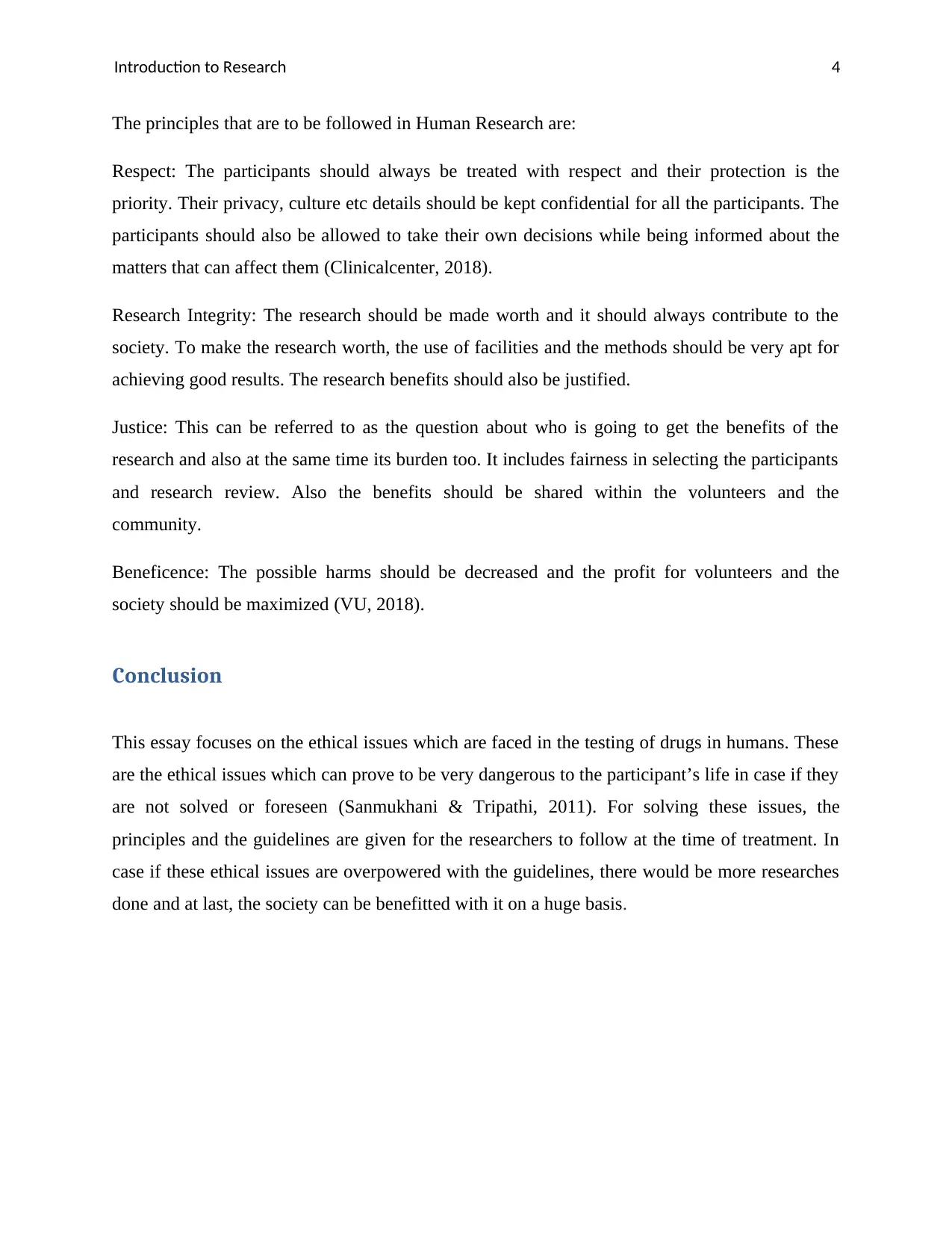
Introduction to Research 4
The principles that are to be followed in Human Research are:
Respect: The participants should always be treated with respect and their protection is the
priority. Their privacy, culture etc details should be kept confidential for all the participants. The
participants should also be allowed to take their own decisions while being informed about the
matters that can affect them (Clinicalcenter, 2018).
Research Integrity: The research should be made worth and it should always contribute to the
society. To make the research worth, the use of facilities and the methods should be very apt for
achieving good results. The research benefits should also be justified.
Justice: This can be referred to as the question about who is going to get the benefits of the
research and also at the same time its burden too. It includes fairness in selecting the participants
and research review. Also the benefits should be shared within the volunteers and the
community.
Beneficence: The possible harms should be decreased and the profit for volunteers and the
society should be maximized (VU, 2018).
Conclusion
This essay focuses on the ethical issues which are faced in the testing of drugs in humans. These
are the ethical issues which can prove to be very dangerous to the participant’s life in case if they
are not solved or foreseen (Sanmukhani & Tripathi, 2011). For solving these issues, the
principles and the guidelines are given for the researchers to follow at the time of treatment. In
case if these ethical issues are overpowered with the guidelines, there would be more researches
done and at last, the society can be benefitted with it on a huge basis.
The principles that are to be followed in Human Research are:
Respect: The participants should always be treated with respect and their protection is the
priority. Their privacy, culture etc details should be kept confidential for all the participants. The
participants should also be allowed to take their own decisions while being informed about the
matters that can affect them (Clinicalcenter, 2018).
Research Integrity: The research should be made worth and it should always contribute to the
society. To make the research worth, the use of facilities and the methods should be very apt for
achieving good results. The research benefits should also be justified.
Justice: This can be referred to as the question about who is going to get the benefits of the
research and also at the same time its burden too. It includes fairness in selecting the participants
and research review. Also the benefits should be shared within the volunteers and the
community.
Beneficence: The possible harms should be decreased and the profit for volunteers and the
society should be maximized (VU, 2018).
Conclusion
This essay focuses on the ethical issues which are faced in the testing of drugs in humans. These
are the ethical issues which can prove to be very dangerous to the participant’s life in case if they
are not solved or foreseen (Sanmukhani & Tripathi, 2011). For solving these issues, the
principles and the guidelines are given for the researchers to follow at the time of treatment. In
case if these ethical issues are overpowered with the guidelines, there would be more researches
done and at last, the society can be benefitted with it on a huge basis.
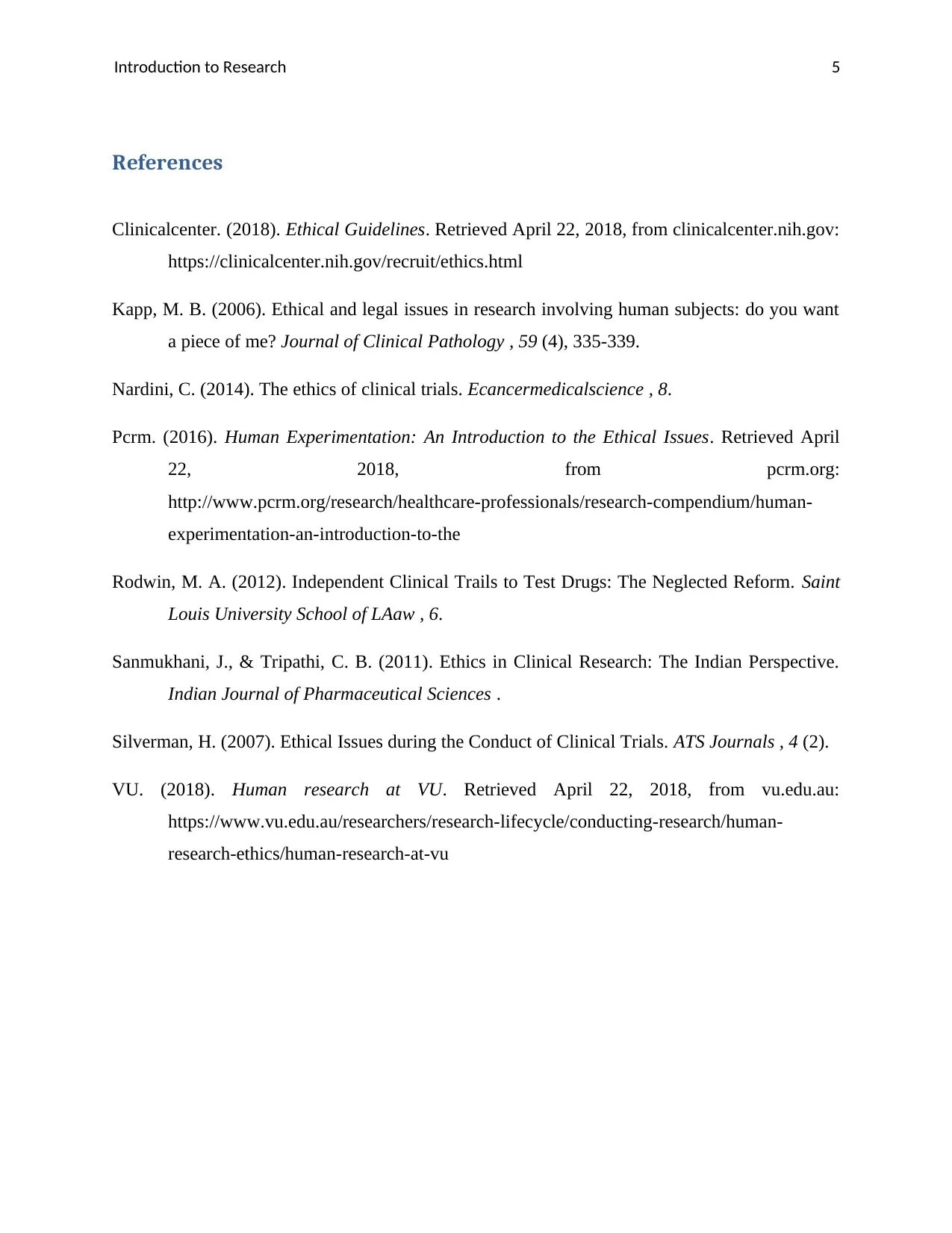
Introduction to Research 5
References
Clinicalcenter. (2018). Ethical Guidelines. Retrieved April 22, 2018, from clinicalcenter.nih.gov:
https://clinicalcenter.nih.gov/recruit/ethics.html
Kapp, M. B. (2006). Ethical and legal issues in research involving human subjects: do you want
a piece of me? Journal of Clinical Pathology , 59 (4), 335-339.
Nardini, C. (2014). The ethics of clinical trials. Ecancermedicalscience , 8.
Pcrm. (2016). Human Experimentation: An Introduction to the Ethical Issues. Retrieved April
22, 2018, from pcrm.org:
http://www.pcrm.org/research/healthcare-professionals/research-compendium/human-
experimentation-an-introduction-to-the
Rodwin, M. A. (2012). Independent Clinical Trails to Test Drugs: The Neglected Reform. Saint
Louis University School of LAaw , 6.
Sanmukhani, J., & Tripathi, C. B. (2011). Ethics in Clinical Research: The Indian Perspective.
Indian Journal of Pharmaceutical Sciences .
Silverman, H. (2007). Ethical Issues during the Conduct of Clinical Trials. ATS Journals , 4 (2).
VU. (2018). Human research at VU. Retrieved April 22, 2018, from vu.edu.au:
https://www.vu.edu.au/researchers/research-lifecycle/conducting-research/human-
research-ethics/human-research-at-vu
References
Clinicalcenter. (2018). Ethical Guidelines. Retrieved April 22, 2018, from clinicalcenter.nih.gov:
https://clinicalcenter.nih.gov/recruit/ethics.html
Kapp, M. B. (2006). Ethical and legal issues in research involving human subjects: do you want
a piece of me? Journal of Clinical Pathology , 59 (4), 335-339.
Nardini, C. (2014). The ethics of clinical trials. Ecancermedicalscience , 8.
Pcrm. (2016). Human Experimentation: An Introduction to the Ethical Issues. Retrieved April
22, 2018, from pcrm.org:
http://www.pcrm.org/research/healthcare-professionals/research-compendium/human-
experimentation-an-introduction-to-the
Rodwin, M. A. (2012). Independent Clinical Trails to Test Drugs: The Neglected Reform. Saint
Louis University School of LAaw , 6.
Sanmukhani, J., & Tripathi, C. B. (2011). Ethics in Clinical Research: The Indian Perspective.
Indian Journal of Pharmaceutical Sciences .
Silverman, H. (2007). Ethical Issues during the Conduct of Clinical Trials. ATS Journals , 4 (2).
VU. (2018). Human research at VU. Retrieved April 22, 2018, from vu.edu.au:
https://www.vu.edu.au/researchers/research-lifecycle/conducting-research/human-
research-ethics/human-research-at-vu
⊘ This is a preview!⊘
Do you want full access?
Subscribe today to unlock all pages.

Trusted by 1+ million students worldwide
1 out of 6
Related Documents
Your All-in-One AI-Powered Toolkit for Academic Success.
+13062052269
info@desklib.com
Available 24*7 on WhatsApp / Email
![[object Object]](/_next/static/media/star-bottom.7253800d.svg)
Unlock your academic potential
Copyright © 2020–2026 A2Z Services. All Rights Reserved. Developed and managed by ZUCOL.





